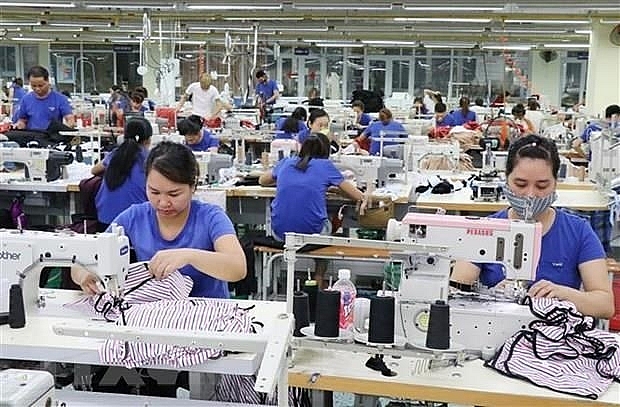Businesses have yet to pay due attention to CPTPP: forum
 |
| The garment factory of the TNG Investment and Trading JSC in Thai Nguyen province (Photo: VNA) |
According to a survey conducted by the Vietnam Chamber of Commerce and Industry (VCCI), more than 70 percent of 8,600 interviewed companies haven’t known clearly about the CPTPP.
Director of the VCCI’s WTO and Integration Centre Nguyen Thi Thu Trang noted 84 percent of the businesses lack information about commitments under the deal and ways to realise them.
She said state agencies have also not been active enough, adding that ministries, sectors and localities’ issuance of their action plans for the CPTPP implementation has been half a year behind schedule.
Trang also pointed out the sluggish dissemination of the trade pact among civil servants and enterprises, along with cumbersome taxation and customs procedures which are hampering Vietnamese firms from improving their competitiveness.
According to the official, localities and businesses, not the Government or ministries, play a main role in realising the CPTPP’s commitments. Businesses will be unable to make use of opportunities generated by the agreement if they do not understand the deal. Additionally, local civil servants should also be given more access to CPTPP-related information so that they won’t violate the deal’s commitments or obstruct enterprises’ activities.
Echoing the view, Ngo Chung Khanh, Deputy Director of the Multilateral Trade Policy Department under the Ministry of Industry and Trade, said since the CPTPP took effect, businesses’ attention to the agreement has been limited to just 12 questions they sent to the ministry, which is too modest compared to the large business community of Vietnam.
Trang said state agencies need to take drastic actions to carry out the CPTPP while businesses should actively learn about and make use of the deal and report the difficulties facing them to authorities.
The CPTPP – one of the largest trade deals in the world – covers a combined GDP of more than 13.8 trillion USD and a market of 500 million people. It gathers 11 countries, namely Australia, Brunei, Canada, Chile, Japan, Malaysia, Mexico, New Zealand, Peru, Singapore and Vietnam.
It officially took effect in Vietnam on January 14 this year.
What the stars mean:
★ Poor ★ ★ Promising ★★★ Good ★★★★ Very good ★★★★★ Exceptional
Related Contents
Latest News
More News
- State corporations poised to drive 2026 growth (February 03, 2026 | 13:58)
- Why high-tech talent will define Vietnam’s growth (February 02, 2026 | 10:47)
- FMCG resilience amid varying storms (February 02, 2026 | 10:00)
- Customs reforms strengthen business confidence, support trade growth (February 01, 2026 | 08:20)
- Vietnam and US to launch sixth trade negotiation round (January 30, 2026 | 15:19)
- Digital publishing emerges as key growth driver in Vietnam (January 30, 2026 | 10:59)
- EVN signs key contract for Tri An hydropower expansion (January 30, 2026 | 10:57)
- Vietnam to lead trade growth in ASEAN (January 29, 2026 | 15:08)
- Carlsberg Vietnam delivers Lunar New Year support in central region (January 28, 2026 | 17:19)
- TikTok penalised $35,000 in Vietnam for consumer protection violations (January 28, 2026 | 17:15)

 Tag:
Tag:




















 Mobile Version
Mobile Version